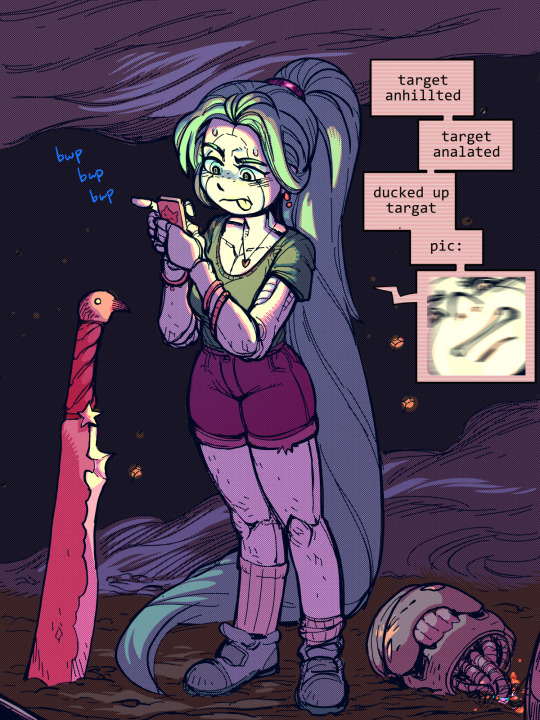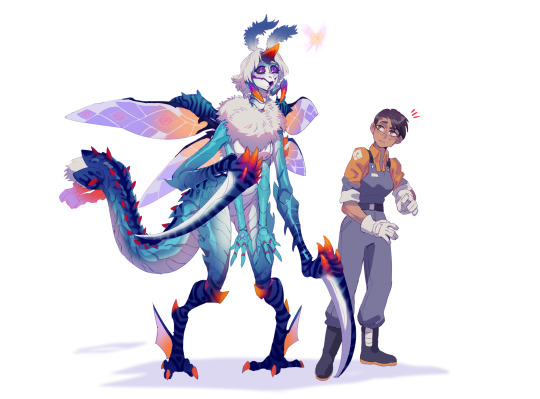Should probably put something here now, huh?
Last active 60 minutes ago
Don't wanna be here? Send us removal request.
Text
It doesn't come up here much, where I mostly post about anime, but I am very much a classically trained nerd.
0 notes
Text
Oh god, the amoral 70s sci-fi protagonist.
I think I first became consciously aware of this reading Consider Phlebas, in which the protagonist Horza seems really weird as a character in a series of 90s/2000s sci-fi novels, but makes perfect sense as an extrapolation of guys like Gully Foyle from Tiger! Tiger!
funny thing about Logan's Run is that the protagonist is basically a nazi or more specifically an SS officer, running around dressed in a conspicuous black uniform shooting people trying to escape the youthful shopping mall paradise, and he doesn't do his job reluctantly either he is straight up tormenting the folks he's about to kill, with zero interest in mercy or rehabilitation (ironically it's his friend, who ends up being the antagonist, that actually offers him a twisted form of mercy on a couple of occasions).
then due to unexpected circumstances beyond his control he ends up as one of the criminal runners he was formerly persecuting and he is super butthurt about this and demands that people not punish him for it, and when people point out that he used be doing the punishing he exclaims yes I didn't care then but now it's me!
...and the movie just shrugs and accepts that his morality is entirely contingent on what's good for him? I'm not sure if any of the other characters have a more developed sense of ethics, and it would make more sense if they were all teenagers (like the book) and we do in fact see one gang of feral teenagers in a scene that doesn't really go anywhere; a totalitarian society in which nobody is over 18 probably would have a pretty messed up sense of morality.
the movie ends with the whole society exploding and the young folk emerge blinking into the light to marvel at stuff they've never seen before like the sun and an old guy who now represents everything about the outside world and the past they've never known, so you really have to hope he's not as senile as he appears and hasn't entirely succumbed to dementia yet or it's going to get even more confusing for everyone involved.
anyway I just thought it was funny that the movie follows a not entirely unusual arc of a guy on the wrong side learning a valuable lesson except in this case he doesn't really draw any broader moral conclusions from it at all though and would presumably still be totally okay with murder in other situations.
21 notes
·
View notes
Text
I've wondered for a while about what the biggest gaps in these word-to-vec spaces are.
(i.e what are the vectors it can encode that are furthest from any actual word, and can we approximate what a word would have to mean to be there?)
...I could probably do this myself.
lmao actual investigation into the mathematical essence of the slur
135 notes
·
View notes
Text

holy shit, an ask game thats actually good
346 notes
·
View notes
Text
I'm just glad to be part of something (the problem)
3 notes
·
View notes
Text

Although made up of highly advanced Magi-Tech, Ai Adventurers are consistently awful at using technology themselves.
They will always deny this fact, when pressed.
482 notes
·
View notes
Text
Having read the book, it's remarkable how little the movie took from it: basically just the idea of a society that kills people at a fixed age (but in the book it's eighteen IIRC, which is a very different dynamic. And no "carousel" fig-leaf either)
it's fun watching Logan's Run after I, Robot and see how visions of the future have evolved and stayed the same over thirty years; I think the older sci-fi was more ambitious in its vision of social changes, but those tropes that in the future everyone will wear identical form-fitting jumpsuits or classical togas just seem hard to shake.
40 notes
·
View notes
Text
Thoughts on this guy:

?
it's fun watching Logan's Run after I, Robot and see how visions of the future have evolved and stayed the same over thirty years; I think the older sci-fi was more ambitious in its vision of social changes, but those tropes that in the future everyone will wear identical form-fitting jumpsuits or classical togas just seem hard to shake.
40 notes
·
View notes
Text
Everyone say thank-you to industrial society, and its consequences.
Sprinkling some paprika and cumin on my hummus, while sipping a watermelon smoothie and waiting for my coffee to brew, I reflect on how many options are afforded to me by being able to readily reduce things to a powder, paste or slurry.
2 notes
·
View notes
Text
Sprinkling some paprika and cumin on my hummus, while sipping a watermelon smoothie and waiting for my coffee to brew, I reflect on how many options are afforded to me by being able to readily reduce things to a powder, paste or slurry.
2 notes
·
View notes
Text

(source : unreal fish on twitter/pixiv)
94 notes
·
View notes
Text
Shockingly few people in the notes actually trying to answer the question.
I'd go for: blood orange (obvious), pomegranate (for the underworld connection, also dark red), fig (because of the wasps), dragon fruit if they have the white type (monochrome, also dragons) and mulberry (will make the resulting mixture almost black, invokes silk and the horrible deaths of caterpillars)

149K notes
·
View notes
Text
A: You could never understand! You don't know what I've been through!
B: well, I got the gist of the story. Sounds like it really sucked.
A: ... huh. I guess you do understand. I don't know why I thought it was complicated just because it was bad.
3 notes
·
View notes
Text
I have long criticized isekai and adjacent settings as generic, and criticized the prioritization of wish fulfillment as not producing the most gripping of stories.
But there is a whole other dimension to it that I have only lightly touched on so far, which is that the genre in general tends to overly literalize and delineate things that were meant to be abstractions and only work as such.
For example, things like experience levels and character stats mean to represent what a character in a game can do in general terms, but games generally try to have a certain level of immersion by not referencing these things explicitly in their stories.
For example, a game's UI might inform you about what your stats or skills need to be in order to do something, but the characters generally will not be saying stuff like "Sorry, I only give this quest to people who are at least level 10" or "You need at least 10 more points in strength to join this faction".
Gamified isekai worlds show us what can go wrong in storytelling when you dispose of subtlety in discussing those kinds of numerical character attributes, even if you just accept that's how the setting in those stories operates.
One issue that comes to mind is that in a lot of ways it is like adding power levels to your characters, with all the problems that brings, but it also minimizes various feats (and even character growth) into simple stat calculations, which kind of makes them feel less impressive or emotionally charged. It even makes the magic far less magical because in its gamified state it is overly legible and exploitable. Stuff is just not as wondrous or impressive to me if I know the characters are just statchecking all of their challenges rather than winning because of earlier (and ideally thematically-relevant) decisions or strategies.
It also used to be that characters gained new abilities or transformations by confronting their flaws, bonding with some kind of mentor, and/or putting in some kind of specialized training that causes them to grow as people and earn their power, not just leveling up and spending skill points.
#lmao#but I've made the point in the op somewhat less eloquently before#a setting with explicit game mechanics isn't the setting of a videogame
247 notes
·
View notes
Text
This is what happens when you put a marine recruit in fresh water

Marine recruit wading through the pond during the Confidence Course. MCRD Parris Island, SC
116 notes
·
View notes
Text
Under-noticed thing about Japan (and occasionally China too): they put peaches upside-down.
i.e. stalk side down, the other way up from how they grow on a tree.
0 notes
